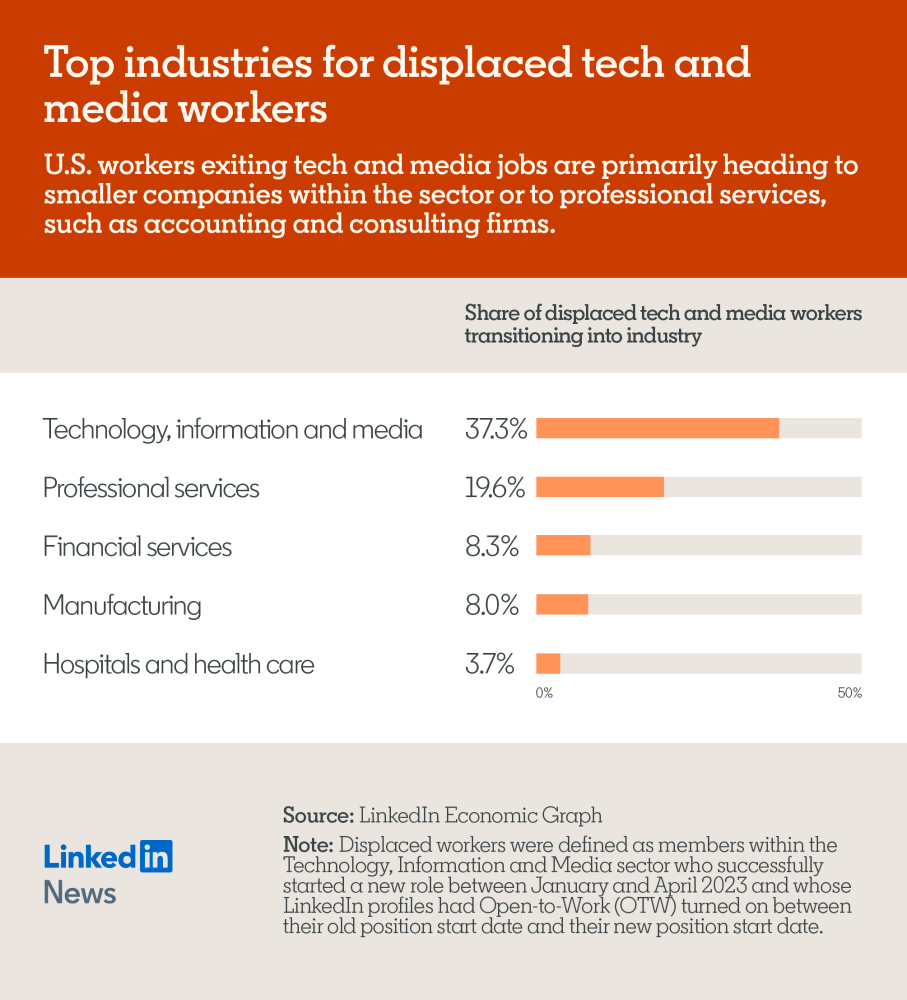Why You Should Seek Tech Jobs Outside of the Tech Industry
Organizations outside the tech sector have realized that the opportunity to hire recently laid-off talent is an even broader opportunity to build strong and transformative tech capabilities within their own companies.

The concept of a 'tech job' is evolving. Traditional tech roles are no longer confined within the walls of tech companies, expanding into more industries. This shift is especially pertinent in light of recent layoffs in the tech sector, prompting many to reconsider their career paths and other industries to consider the value that tech functions can contribute to their workstreams. With these changes under way, why limit yourself to the world of big tech and VC-backed start-ups?
Tech Jobs vs. Tech Companies: Understanding the Difference
At its core, a tech job involves working with technology – be it in programming, data analysis, or digital design. A tech company, on the other hand, has its primary business model rooted in technology, like a software or hardware company. However, as technology becomes integral to all industries, the lines are blurring. Tech is now a layer of all companies versus just a slice of the economy.
Layoffs in Tech: A Catalyst for Change
After a period of rapid hiring in the aughts, tech companies of all sizes had to make difficult decisions due to the impact of macroeconomic challenges of the last several years. As a result, layoffs in the tech industry totaled over 400,000 across 2022 and 2023. These layoffs are largely tied to the big tech and VC-backed start-ups — both of which are directly tied to the fundraising ecosystem inherent to the tech industry. You can find more information about these layoffs at layoffs.fyi.
As a result, organizations outside the tech sector have realized that the opportunity to hire recently laid-off talent is an even broader opportunity to build strong and transformative tech capabilities within their own companies.
Tech Jobs' Universal Relevance
Tech jobs are universally relevant because technology itself has become a required part of any modern business. This relevance is not confined to any single sector but spans across all industries, making tech skills some of the most valuable and transferable in the job market today.
- Digital Transformation Across Industries: Whether it's automating processes, leveraging data analytics for decision-making, or developing digital platforms for customer engagement, almost every industry is undergoing digital transformation
- Efficiency and Innovation: Tech jobs bring efficiency and innovation to traditional industries. For example, in manufacturing, the integration of IoT (Internet of Things) and AI can streamline production processes and reduce costs. In healthcare, tech advancements enable better patient data management and the development of life-saving tools like telemedicine and AI-assisted diagnostics.
- Data Utilization and Analysis: Data has become a crucial asset for businesses. Tech roles that specialize in data analysis, such as data scientists and business analysts, are essential in extracting insights from data to inform strategy and operations, regardless of the industry.
- Customer Experience and Engagement: With the rise of digital platforms, enhancing customer experience through technology has become a priority. Tech roles focused on web development, UX/UI design, and digital marketing contribute significantly to engaging customers in a more personalized and efficient way.
The reality is that regardless of public, private, or non-profit, customers expect cloud, web and mobile experiences with all their products. Governments, media, entertainment companies — everyone — have started to recognize that intuitive and available technologies are a requirement for their customers and communities, making tech far more wide-reaching than it’s ever been before.
Where to Get a Tech Job in Another Industry
LinkedIn’s Economic Graph team recently tracked thousands of displaced workers from tech and media companies as they set out to find new jobs.
The key insight: Five fresh career paths stand out, and only one of them involves finding another job in tech. Overall, 37.3% of displaced workers in tech, media and information are landing anew in the same sector, down from a rate of more than 40% a few years ago. Meanwhile, nearly two-thirds of displaced tech workers are venturing into a wide cross-section of new industries.
Check out this mapping of new career paths from the LinkedIn report:

Professional services firms are hugely pursuing tech expertise to drive their consulting practices. Category leaders such as Accenture and EY now rank software engineering or information technology among their three most common job functions.
The desire to develop IT and software capabilities is also strong in the financial services industry, with 8.3% of displaced tech sector workers finding employment there. Even leading banks like JPMorgan are actively striving to attract top talent. In a letter to investors, JPMorgan CEO Jamie Dimon emphasized the importance of artificial intelligence as "an extraordinary and groundbreaking technology" that will play a critical role in the company's success.
Within manufacturing, the hiring of former tech workers is especially active among carmakers working hard on autonomous driving (such as Cruise and Tesla) as well as at medical equipment makers and aerospace companies — this also from the LinkedIn report.
And it’s important to note that these industries aren’t the only options: fields such as hospitals and health care, administrative and support services, and entertainment providers make the top-10 list, along with retail, education and consumer services.
Tech Roles and Salary Ranges in Other Industries
Data Scientist
The Bureau of Labor Statistics (BLS) projects a 36% growth in job outlook between 2021 and 2031, which is much faster than the average growth rate for all occupations. This means that approximately 40,500 new jobs are expected to be added to the job market over the next decade. The average salary according to Glassdoor: is $157k.
Also available on BLS are the industries where data scientists are most likely to work:
- Computer systems design and related services — 15%
- Management of companies and enterprises — 10%
- Insurance carriers and related activities — 9%
- Management, scientific, and technical consulting services — 7%
- Scientific research and development services — 5%
Web Designer
BLS stats indicate a 23% increase in demand for web developers and digital designers between 2021 and 2031. This means that the job market is expected to add 21,800 web designer and developer positions over the next decade. Glassdoor estimates that web designers earn an average salary of $81k.
Top industries hiring web designers include:
- Computer systems design and related services — 16%
- Software publishers — 13%
- Retail Trade — 5%
- Finance and insurance — 5%
- Advertising, public relations related services — 4%
Full Stack Developer
BLS estimates a 23% increase in job outlook from 2021 to 2031, which is much faster than the national average for all occupations. This means that approximately 21,800 prospective jobs will be added to the tech job market. This is great news, especially considering that full-stack developer jobs have high-paying potential. Glassdoor reports that the average salary for a full-stack developer is $162k.
Full stack developers could consider industries including:
- Computer systems design and related services — 19%
- Educational services; state, local, and private — 8%
- Other information services — 6%
- Advertising, public relations, and related services — 6%
- Self-employed — 6%While these are only a sampling of tech roles and their broader potentials, it’s important to note that transferable skills from tech are highly sought after in other industries. The key is to build an understanding for the industry you’re jumping into, and propose ideas for how to can help effect and streamline progress and change.
The Application Process
Applying in Non-Tech vs. Tech Companies
The application process can differ significantly when applying for a tech job in a non-tech company. Non-tech companies may prioritize different skills, such as adaptability and the ability to translate tech language for non-tech audiences. The hiring process might focus more on how technology can solve industry-specific problems, rather than tech for tech's sake.
Three tips for finding a job:
- Expand your job search beyond tech companies. Tech candidates need to think outside the tech company box and use their creative and analytical minds to consider how their skills and experience might transfer to other industries. For example, if you previously worked at Amazon, you might look into other lesser-known companies in e-commerce or retail — shifting your focus from industry to function.
- Utilize your previous experience. The emergence of tech boot camps and educational programs has allowed individuals from fields like teaching, healthcare, journalism, and more to switch careers to the tech industry. If you have prior experience in your previous industry, it is worth considering looking for a tech job within that industry.
- Use job boards and networking tools that give you more control. Finding jobs in different industries is called if you don’t know the names of companies to look for. Built In is an example of a job board that enables discovery across different industries. You can also sign up for mentorship sessions on Merit — while it focuses in on the tech industry, perspective from diverse talent is always helpful in strategizing a job search.
The realm of tech jobs is expanding beyond the traditional tech industry. This diversification opens up exciting opportunities for tech pros to apply their skills in new contexts and industries. Whether it's due to the desire for stability post-layoffs or the lure of uncharted challenges, seeking tech jobs outside the tech industry can be a transformative moment for your career growth.
